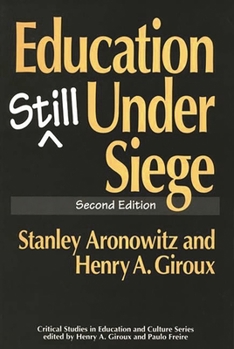Education Still Under Siege
Select Format
Select Condition 
Book Overview
Cultural differences are not asserted through the specificity of dominant notions of race, gender, and class, but through a commitment to expanding dialogue and exchange across cultural lines as part of a wider attempt to deepen and develop democratic public life. This revised edition of the 1985 best-seller speaks eloquently to the need to attend to ever-present inequalities of education in the light of new political correctness, technology, and...
Format:Paperback
Language:English
ISBN:0897893115
ISBN13:9780897893114
Release Date:August 1993
Publisher:Praeger
Length:256 Pages
Weight:0.90 lbs.
Dimensions:0.6" x 6.2" x 9.4"
Customer Reviews
1 rating
Visionaries...
Published by Thriftbooks.com User , 14 years ago
I must admit that after reading "Education Still Under Seige" I was struck by the timeless relevance that Aronowitz and Giroux's critique on the educational system still holds up to this day. It's critical in many respects but critical in pointing out the deficiences under the Regan/Bush years and the continued deficiencies under the last Bush administration. Giroux mentions Former president Clinton as being the hope for a brighter tomorrow in education and makes note of how the neo-conservatives of the time slashed into programs that would help the poorest Americans. The problems that Giroux and Aronowitz point out centers around the governments inability to truly comprehend the rising population of minorities and what their influx into this country means. Seemingly entitled "eurocentric views," and poor attention to crumbling infrastructures that many of the poor must negotiate with are part of the problem. As a result teachers and administrators must work in schools that are conducive to comprimised learning, lacking in funds, gang violence, drug use and a host of other issues that seem to punish the oppressed and reward the affluent. Even now we are still dealing with many of these issues at many of America's inner city schools. Giroux predicts that in the future there will be problems if we implement standardized testing (NCLB) and suggest putting it off for further discussion. Unfortunatedly, that didn't happen and since then NCLB has only helped to put a spotlight on those schools it deems as "Inadequate." Giroux correctly advocates for more social responsiblity and citizenship in our troubled school districts and that more attention be focused on understanding the language and culture of other sub-groups of the American population. The only section of the book that I would disagree with is the part on their interpretation of power in the educational setting. Giroux and Aronowitz suggest Foucault's idea of power and knowledge is essentially a liberating tool to let the oppressed student's voice be heard. It almost seems as if they are saying that Foucault meant that teachers should "empower" their student to make change by focusing on the connection between power and knowledge. I personally do not believe that Foucault was implying this appealing scenario. It's not necessarily the case that we give voice to the oppressed but to just understand the inherent power in the structure in which we reside and work in. Apart from this I believe that this book is a very good read and would highly recommend the book to all future educators of America.





